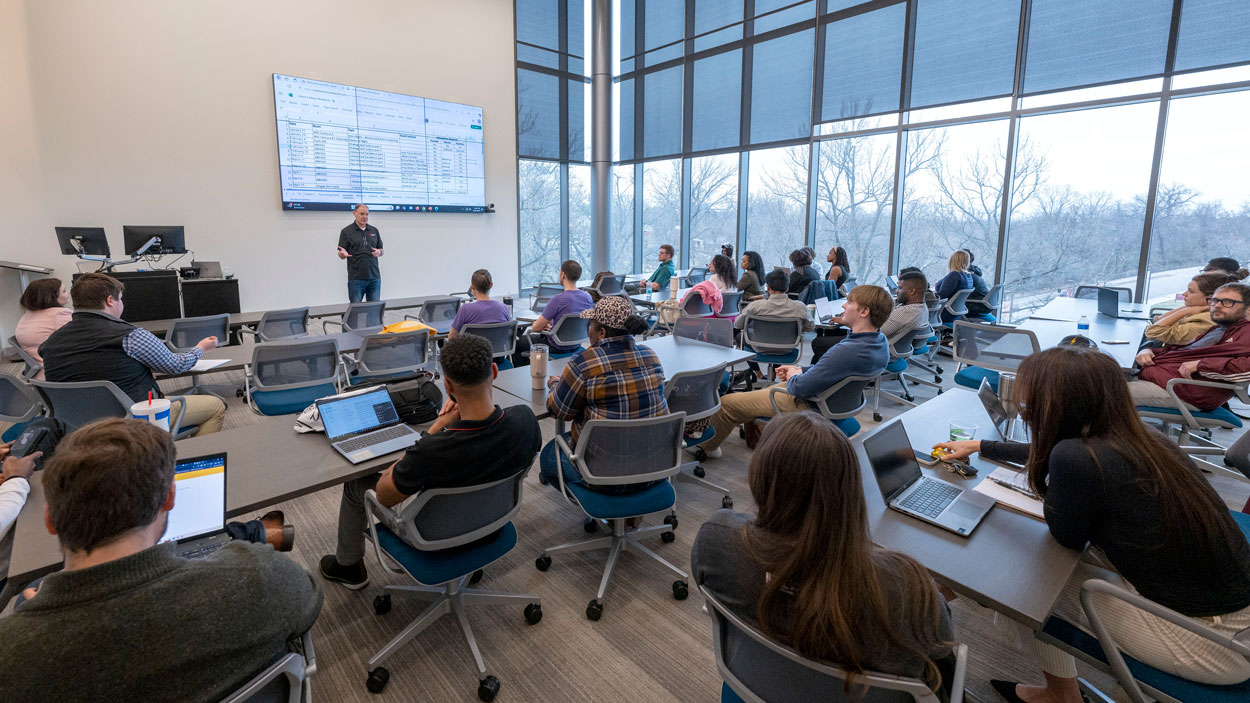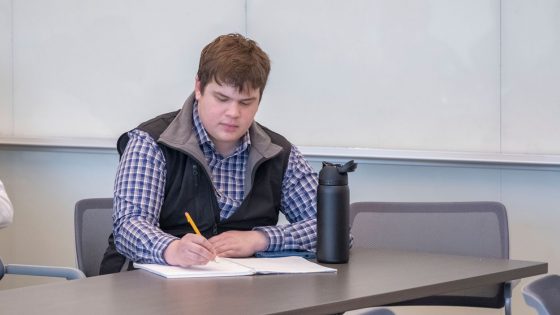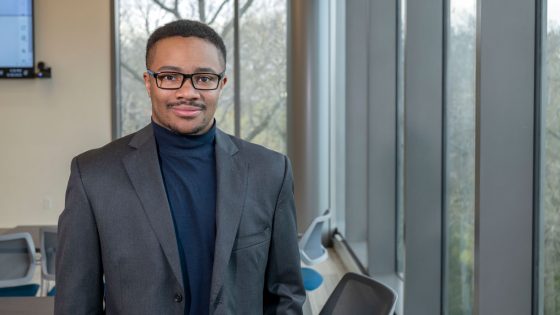
EIC Director Scott Morris speaks to the group of founders, mentors and students that gather every Tuesday evening on campus as part of the Anchor Accelerator program. (Photos by Derik Holtmann)
Scott Morris is relentlessly pursuing the University of Missouri–St. Louis’ goal of making the Entrepreneurship and Innovation Center an essential element of the entrepreneurship ecosystem in the St. Louis region. This semester, a very important element of that equation has become a reality for Morris, the director of the EIC.
UMSL students are now fully part of the creative environment with an immersive internship opportunity, working directly with the Anchor Accelerator founders and mentors. In the past, student internships were available, but this new expanded program is much more structured.
Each of the 13 cohort teams are comprised of the company founder/entrepreneur, one or two student interns and one or two mentors from the professional world who have agreed to help both the students and the entrepreneurs themselves.
“In many cases, this is the interns’ first taste of the real business world,” Morris said. “They are sitting at the table with the CEO and founder of a local business solving real business problems. That is literally being part of an executive team at this very young age.”
The founders, mentors and a total of 20 interns all gather together every Tuesday on campus from 6 to 9 p.m. for class. The founders are working toward their Entrepreneurship Certificate, while the students are either taking the class for credit – Entrepreneurship 4100 or Marketing 5795 – or are participating as part of a paid internship program.
There are five modules that Morris will lead the group through during the semester: Strategy and Culture, Commercial Excellence, Operational Excellence, Entrepreneurial Finance and Ownership Objectives. The students, both undergrad and graduate, have projects for class and also meet with the founders at least once a week, though typically more often.
It’s an opportunity the students recognize as unique.
“Going into my master’s program straight from my undergrad, this class feels like I’m applying a lot of theory that I’ve learned in the past,” grad student Sonya Yereshchenko said. “Before, yes, it felt very important to know your target market, to know your business values and goals and strategies. The difference is this is not just a project I’m working on for myself or with my classmates. There is a very real person who is leading this and cares about my ideas. It’s his life’s work, and his passion that is driving this project forward, so I want to do my best for his company.”
Yereshchenko, who graduated from Lafayette High School at 16 and already has her bachelor’s in international business from UMSL, is in the first semester of her MBA program.
As a musician, she’s considered ways to meld her two interests – music and business – and this internship has been the ideal fit. She’s working with founder Calvin Windschitl’s company, Habitat Financial, which creates financial management software to specifically help musicians handle royalty processing and payments. Yereshchenko and Eric Sepulveda, another student in the class working with Habitat Financial, are getting on-the-job experience learning how to develop marketing strategies and how to build a mission statement and express the company’s core values as Habitat Financial prepares to scale up its reach.
Their cohort team includes two mentors: Ken Moire, who brings a technical/software background, and Jon Heisserer, a music producer.
“I’ll go to Ken whenever it’s a business question,” Yereshchenko said. “But I’ll go to Jon whenever I have questions like, ‘OK, Calvin needs to be targeting these owners of independent labor pools, which is really a specific market. What platforms are they on? How do I get in contact with those people? What are you as a music producer watching? What kinds of content are you consuming?’ That’s really cool because of the different perspectives.”
And all sorts of different perspectives are shared at the Tuesday gatherings.

UMSL senior Tommy Gerding is working with founder Jordan Russell and his company, R2 Industries.
“It’s been pretty awesome to hear the different founders and interns talk about what they’re doing, what their company does,” senior Tommy Gerding said. “We’re all trying to solve something, and with everyone coming together, that offers different perspectives on how to find solutions.”
Even across the wide array of industries, the themes are the same.
“Sometimes I’ll see some of the founders chuckle whenever one person says something,” Yereshchenko said, “because they’re like, ‘Oh yeah, I get that.’”
Gerding is working with founder Jordan Russell, the CEO and co-founder of R2 Industries, a company that produces laser dicing machines for semiconductor manufacturing applications. As part of his internship, Gerding, who is on track to graduate this May with a bachelor’s in finance with minors in accounting and psychology, does market analysis, financial forecasting and operational strategy and explores different funding strategies.
“I’ve seen things like the importance of resilience when doing a startup, his adaptability to change and his vision of his startup and his leadership capabilities,” Gerding said. “Those have definitely been some of the things I’ve admired so far working with him.”
The cohort’s mentor is Paul Martin, the CFO of Perficient.
“I’ll work on something and show Jordan, then he’ll offer feedback and ask questions, and then make a final version and send it to Paul,” Gerding said. “Then Paul will give us his initial feedback on whether he thinks what we’re doing is correct. He’s been great. I know he’s very busy, as a CFO of a big company, but any time we’ve sent him something, he has taken the time to provide us feedback and give us good advice on where to go with it.”
The course progress follows what an entrepreneur would experience in the course of growing – or scaling up – a business, and that includes finding revenue sources to help scale up the companies.
“We’re engaging with local lenders and investors, either high net-worth individuals that are acting as angel investors, or banks that are acting as lenders,” Morris said. “This is a whole other level of experience that, in the course of their career without this program, the students might not get there until they’re 30 or even 40 years old. We can give them that experience here. The hope is it makes them better employees or better entrepreneurs.”
Founder Mackenzie Johnson started making treats for her miniature schnauzer when she was 13, and those treats have expanded into a company, Bella’s Pet Products. Johnson is a student at Southeast Missouri State University and makes the drive up from Cape Girardeau every Tuesday for the class.
Rachel Burns, an Anchor Accelerator alum herself with her company Bold Spoon Creamery, is the mentor with this cohort, and UMSL grad student Clayton Bruce is working with Burns.

Graduate student Clayton Bruce is working with Mackenzie Johnson, founder of Bella’s Pet Products.
“With the class, we’re developing a presentation to ship off to investors, so we’re focusing on getting her financials in order and basically giving the ‘why’ you should invest with this company,” said Bruce, who is pursuing his MBA with a marketing emphasis. “That’s really what the presentation is about, and we’re going to focus more on the strategy.”
Bruce brings a wealth of experience to the role.
He’s previously held internships with the National Geospatial-Intelligence Agency and Washington University in St. Louis, and he’s helped Perry Drake, the chair of UMSL’s Marketing and Entrepreneurship Department, with preparations for the annual Midwest Digital Marketing Conference held at the Blanche M. Touhill Performing Arts Center on UMSL’s campus.
“We’re working on developing a strategy to get more people involved,” Bruce said. “This stage is kind of like the marketing plan and the finance plan, so we’re getting the data together and showcasing how to slowly expand the scale of the business.”
Etaf Abdallah’s cohort is on the other end of the experience scale. She’s doing her internship with Missouri Equipment Company, which has been around more than 75 years but wanted to be involved with the Anchor Accelerator program as a way of approaching a strategy refresh, recognizing the company’s need to transform for the future.
“I basically help research market trends,” said Abdallah, who started full-time at UMSL at 16 years old and is a sophomore. “Currently we’re working on the business plan and the PowerPoint to go with it. I’m working with a mentor, Greg Waters, who is in operations, so I really get to see how everything plans out from the supply chain aspect of things and manufacturing.”
Abdallah is pursuing a cybersecurity degree with an information systems emphasis, and while learning how the company operates, she’s also getting an opportunity to see how she could put her future cybersecurity degree to use at similar companies.
“It definitely is a different perspective,” she said. “I get to see a lot of the business aspect of things and how they’re handled. Every company needs cybersecurity. I’ve been looking at their systems, and I’m hoping to potentially do my own personal project during the internship that would maybe help the founder of the business with their cybersecurity.”
And that’s one of the goals of this program, to put students into active roles with these companies to see how their skills can translate when they are ready to begin their careers.
“My hope is that whether these students go on to own their own business one day or just work in a larger corporation, they now know how to have a seat at the table,” Morris said. “They know what it’s like to interact with senior executives and entrepreneurs.”
The course wraps up with a final session on April 15.
“Maybe they don’t get that first job because of the experience they have in this class, but we’re going to get them promoted faster because they’re comfortable, they’re more mature, they bring a deeper skill set,” Morris said. “I describe it as workforce ready. They’re going to launch into their careers as absolutely workforce ready, prepared to make a difference and contribute at a high level.”














